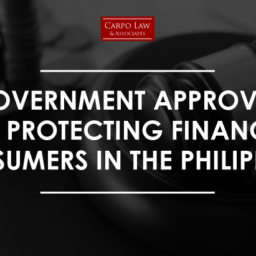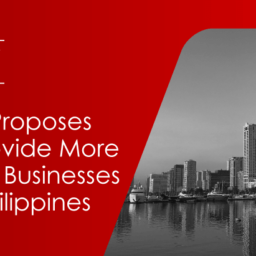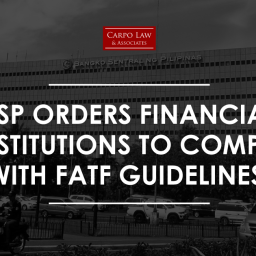
Registering Secondary License in the Philippines: BSP and POEA/DMW
What this article will cover:
- Activities requiring secondary licenses
- Setting up a Land Based foreign private recruitment and placement agency (PRA)
- General Requirements for PRA License Application
- Setting up an Operator of Payment Systems (OPS)
- General Requirements for an OPS License Application
- Setting up a Land Based foreign private recruitment and placement agency (PRA)
Prior to setting up and starting a business in the Philippines, it is important to ensure that you have all the necessary licenses and certifications. However, some entities that engage in regulated activities will be required to apply for a secondary license.
While a corporation may be organized for any lawful business activity, some activities require the approval of certain government agencies before a corporation may be lawfully organized and granted a juridical personality by the Securities and Exchange Commission (SEC). Such approval refers to the Secondary License.
To give you a general understanding of secondary licenses, our Firm will be posting a series of articles tackling the general requirements of the various secondary licenses required by certain regulated activities. For this article, we will tackle deciding to engage in foreign recruitment and placement activities and entities intending to start up in Fintech by way of engaging as an Operator of Payments System.
Activities Requiring Secondary Licenses
For this edition, our focus will be for those corporate entities intending to:
- Procurement of a license to engaged as a Land Based foreign recruitment and placement agency; and
- Setting up an Operator of Payment Systems.
Setting up a Land Based foreign private recruitment and placement agency (PRA)
This is to be procured from the Department of Migrant Workers (formerly the POEA), and this is one of the most highly-regulated business activities in the country due to the paramount need to guarantee the safety and the humane working conditions of OFWs deployed abroad.
Given the considerable amount of requirements, this publication will mainly provide a birds-eye view on the general requirements as provided under Department Circular 01-2023, issued by the DMW.
*Note: The pre-qualification and post-qualification requirements will be added upon the release by the DMW of the relevant regulations.
General Requirements for PRA License Application
Pre-Qualification
- The prospective applicant/recruiter must be a registered business entity. Such an entity may either be a Filipino sole proprietor or a partnership, a one-person corporation, or a corporation with at least seventy-five percent (75%) of the authorized and voting capital stock of which is owned and controlled by Filipino citizens.
- The sole proprietor and partnership must have a minimum capitalization of Five Million Pesos (PhP5,000,000.00) whereas a corporation must have a minimum paid-up capital in cash of Five Million Pesos (PhP5,000,000.00).
- The sole proprietor, partnership, one-person corporation, or corporation should substantially maintain an equity at Five Million Pesos (PhP5,000,000.00) during the duration of its license.
- Submission of the Application form and the documents for pre-qualification of which the specifics will be provided by the DMW in a later issuance.
- Payment of non-refundable Filing fee of Fifty Thousand Pesos (Php50,000.00);
- An escrow agreement with a bank authorized by the Bangko Sentral ng Pilipinas to handle trust accounts, with deposit in the amount of One Million and Five Hundred Thousand Pesos (Php1,500,000.00) together with a bank certificate of deposit. (N.B. The escrow deposit is separate from the capitalization requirement.)
- The Proponents (collectively referring to a Single Proprietor, One Person Corporation, or to all the Partners, Members of the Board of Directors, and/or Shareholders of any agency or entity) including major shareholders, shall undergo a panel interview to ascertain their qualifications and fulfillment of the requirements;
- The submission of post-qualification requirements to be prescribed by the DMW in case the applicant is deemed qualified;
- After compliance with all the requirements and after approval of the application, a payment of a license fee of Two Hundred Thousand Pesos (Php200,000.00) to be paid before the Provisional License is released;
The Provisional License shall be valid for a non-extendible period of three (3) years from the date of issuance. It may be upgraded into a Regular License upon compliance with any of the following:
- An application for upgrading made within three (3) months before the expiration of the provisional license; OR
- An application for upgrading made upon the deployment of at least one hundred (100) workers, except domestic workers.
It should be noted that the application for upgrading must come with the submission of documents and requirements, which are to be prescribed by the DMW in a later issuance.
After the approval of the application for a regular license, a license fee in the amount of Two Hundred Thousand Pesos (Php200,000.00) shall be paid before the license will be released.
The regular license shall be valid for six (6) years counted from the date the provisional license was issued unless sooner revoked, terminated, suspended, or cancelled by the Secretary or his/her duly authorized representative.
For the renewal of the regular license, take note that the application and its supporting documents must be made within three (3) months prior to the expiration of the license. A renewal of license fee in the amount of Two Hundred Thousand Pesos (Php200,000.00) shall be paid before the license is released.
Setting up an Operator of Payment Systems (OPS)
In recognition of the crucial role of payment systems in the overall financial infrastructure of the country, it is vital that such payment systems function safely, reliably, and efficiently in order for the country to attain its monetary policy objectives.
Given its vital role in shaping the monetary policy of the country, the BSP is mandated by the National Payment Systems Act (“NPSA”) as the regulatory body of such payment systems.
General Requirements for an OPS License Application
First and foremost, an OPS must be incorporated as a stock corporation for the purpose of operating a payment system.
Once the OPS is incorporated as such, a self-assessment must first be undertaken by the applicant in order to determine whether or not it should register as an OPS. In such self-assessment, the applicant determines whether it conducts any of the following activities:
a. Maintains the platform that enables payments or fund transfers, regardless of whether the source and destination accounts are maintained with the same or different institutions;
b. Operates the system or network that enables payments or fund transfers to be made through the use of a payment instrument;
c. Provides a system that processes payments on behalf of any person or the government; and
d. Such other activities similar to the foregoing, as may be determined by the Monetary Board.
For more specifics as to the self-assessment, please see the application form posted in the BSP website which we have linked herein.
After such self-assessment, the OPS must accomplish and submit an Application for Registration (Form 1) to the BSP. Such form must be signed by the president, chief executive officer, or a senior officer holding an equivalent position.
Along with the Application Form, the OPS must submit the following:
- Business Plan, which includes the description of its existing business, business model and target markets; and
- Copy of the business registration/permit indicating the line of business of the OPS, from the city or municipality that has territorial jurisdiction over the principal place of business of the OPS for the current period.
Moreover, it is critical to note that the Application Form along with the required attachments must be submitted to the BSP within one month from the date the OPS started offering its OPS activities to the general public unless the following circumstances apply:
- A regulator or government agency requires appropriate action from the Bangko Sentral prior to the start of the OPS business;
- The OPS offers remittance services as well as other similar activities performed by money service businesses; and
- Such other circumstances, as may be determined by the Monetary Board.
Upon the approval by the BSP of the OPS License Application, a Certificate of Registration will be issued of which the OPS must pay a registration fee.
Be Properly Guided in Acquiring Your Secondary License
The booming business opportunities in the country make expansion and diversification possible. This can unlock your company’s maximum potential by carefully exploring areas that can contribute to business growth.
If you want to know more about secondary licenses and how it applies to your company, you may reach out to law firms to learn about the regulations and the processing of complicated licensing documents.
Be Guided in Registering Your Secondary License in the Philippines
With our wide range of experienced lawyers, we are dedicated to assisting you with preparing and processing your secondary license applications.




